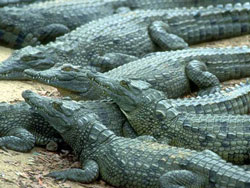Australian croc rolls evolutionary story

Australian palaeontologists announced a new fossil find which they claim overturns previous ideas about crocodile evolution and puts Australia in the ‘box seat’.
Making the announcement, Dr Steve Salisbury from the University of Queensland said ‘We’ve always assumed that modern crocodilians originated in North America or Europe. But this discovery in Australia of the most primitive member of that group indicates their origin probably took place in Gondwana or perhaps in Australia.’
Geologist Dr Tasman Walker of Creation Ministries International (Australia) said, ‘This announcement illustrates how ideas about evolution keep changing. The fossil information is so incomplete. One new find in a remote area of another continent can overturn the neat evolutionary stories that were presented so confidently as fact.’
Ian Duncan, the former mayor of Isisford, a town in far western Queensland, found the first skeleton, less its head, in the mid 1990s. It was named Isisfordia duncani after him.
Subsequent scientific explorations to the remote site, 700 km from the nearest ocean, uncovered the remaining bones plus the skull in a dried-up creek bed.
The international team of palaeontologists claims the fossils represent the world’s ‘most primitive’ modern crocodile.
According to Dr Walker the term ‘primitive’ is just subjective opinion assuming evolution is a fact, ‘From a creationist perspective, virtually all the fossils are about the same age, buried during the global Flood catastrophe some 4,500 years ago. We have a better idea now about when in this catastrophe these animals were buried. ’

Dr Salisbury’s team have now recovered the complete skull from the football-sized rock enclosing it. They estimate the skull to be between 95 million and 98 million years old.
‘The dates they quote are quite flimsy,’ Dr Walker said. ‘They reflect their personal beliefs about what they think happened in the past. Their entire framework of thinking ignores the historical data of the global catastrophe of Noah’s Flood. When we take that evidence seriously, we find a different interpretation for these fossils.’
At 95 to 98 million years, the researchers say that Isisfordia predates modern crocodiles by about 20 million years.
‘This is another example of the so-called fossil ranges expanding as more fossils are discovered,’ Dr Walker said. ‘Evolutionary progression is becoming more and more blurred. This trend means the data fits better with the creationist framework of thinking.’

Isisfordia was smaller than an American alligator and had a flatter and longer snout. It was only a metre long and weighed around three or four kilograms.
‘It’s a nice gesture to give the fossil a new name’, Dr Walker said, ‘but how could anyone be certain that the Queensland crocodile was indeed a different species from the ones found in North America or Europe? We can’t do breeding experiments.’
Walker claims the variation in skeletal shape is likely just variation within the same biblical kind, the same sort of variation seen today in dogs, and in bears—and in cats such as lions, tigers, which can interbreed, all descended from the one group .
‘The crocodile find shows that even within their own frame of reference, evolution must have been stationary for 100 million of these assumed years,’ Walker said. ‘Evolutionists call the problem “stasis”,’ he said, ‘but stasis is not a problem for biblical creation—it supports it.’
‘The floodwaters were still rising on the earth when these animals perished,’ Dr Walker said. ‘We find trackways throughout the strata in western Queensland. At Lark Quarry near Winton they all tend to run in the same direction, all fleeing from the same disaster.’
Walker said that the fossils from these sediments throughout Queensland include terrestrial, amphibian and marine animals and plants. ‘They point to a catastrophe that affected the land, the coast and the ocean. This new crocodile fossil should prompt us to rethink our ideas about the past, and how they shape our understanding of who we are.’


Readers’ comments
Comments are automatically closed 14 days after publication.